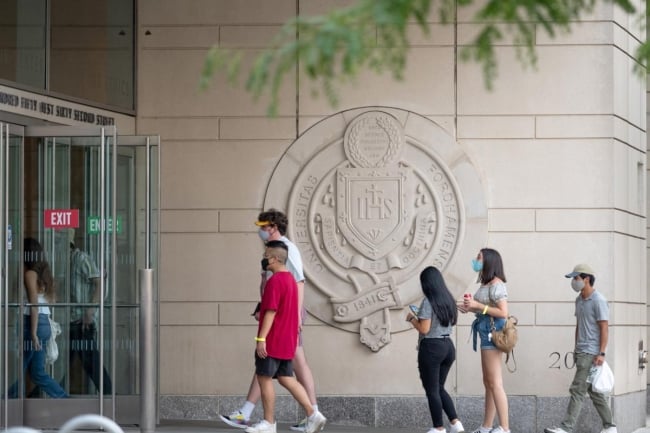You have /5 articles left.
Sign up for a free account or log in.

Masked students walk into a building on Fordham’s Lincoln Center campus. The university’s bivalent booster requirement this fall has sparked outrage among some parents and students.
Alexi Rosenfeld/Getty Images
Fordham University in New York is requiring that students receive the new bivalent COVID-19 booster shot—or a valid exemption—by Nov. 1 or risk being locked out of campus. The decision, announced in a Sept. 26 email, has sparked outrage among parents and students who oppose vaccine mandates or who simply don’t want to get the newest shot.
The backlash has been broader and louder than with any of the Jesuit university’s previous vaccine or booster requirements, which it has had in place throughout the pandemic.
A group of parents called Fordham Parents Together has been circulating a letter protesting the mandate, designated to be sent to university president Tania Tetlow this week. The letter has garnered nearly 1,200 signatures—mostly from parents but also students, alumni and staff members.
“Parents are upset that students and members of the committee have no choice,” said Laura Soricone, a Fordham parent who signed the petition. “This idea that they’ll be disenrolled if they choose not to [get the booster] is crazy. I think the school has some sense that these boosters are going to quell the spread when there’s really no evidence that that’s the case.”
Zachary Viscontis, a sophomore, opposes the booster mandate—but not vaccines in general. His main concern is the lack of choice.
“We definitely support anybody’s decision to get it, or the university to encourage it … I think the largest population of students on campus are those who don’t want to get the booster but say, ‘Well, if I have to get it to stay here, then I’ll get it,’” he said. “It shouldn’t be forced … In the name of safety, you can get away with a lot of things.”
Bob Howe, Fordham’s associate vice president for communications, said opposition to the requirement is negligible and that the university made the decision based on two primary factors: the potential for a winter surge of Omicron infections, and a significant body of evidence that the bivalent booster significantly reduces the risk of transmission.
“We are aware of a tiny fraction of parents who have objections to or concerns about the vaccine mandate, and have considered them carefully,” Howe wrote in an email to Inside Higher Ed. “Weighed against those objections is the evidence for the effectiveness of vaccines and the broad acceptance the mandate has from students, faculty, and staff.”
The new booster shot, also called the bivalent booster, is an updated mRNA vaccine designed to protect against both the original COVID variant and the new Omicron strains. Fordham is providing the vaccines to students on both its Bronx and Manhattan campuses.
Anita Barkin, co-chair of the American College Health Association’s COVID-19 task force, said that while there are a number of valid reasons a college may choose to encourage rather than require full vaccination, mandates are more effective and help ensure the safety of the entire community.
“I feel like a broken record sometimes talking about this,” Barkin said. “The vaccines are safe, they are effective, we support vaccine requirements and we feel the boosters are important to continue the work of stopping the spread of COVID to the greatest extent possible.”
Health Concerns and ‘Freedom of Choice’
Soricone said that when her son, a senior at Fordham, received his first booster, he experienced symptoms of myocarditis, or inflammation of the heart. The pain and fear he endured made him wary of the latest booster.
“To be faced with this idea that you either have to get this shot or not be able to complete your senior year just seems unreasonable,” she said. “I can sympathize with higher ed leaders who have been faced with insanely difficult circumstances … but this just feels like a situation where they’re ignoring the fact that there is a health risk.”
Soricone worries that by requiring the booster—or even recommending it—Fordham is pushing students to get immunized without considering the potential health risks.
“Ideally, they make it available and also provide information to the students so they can make informed decisions,” she said. “These kids are being asked to stick out their arms with no sense of what could potentially go wrong.”
According to the CDC, myocarditis has occurred—though rarely—as a side effect of the mRNA booster, primarily in adolescent and young adult males.
Viscontis said given the short timeline students face to either get the vaccine or secure a valid medical or religious exemption, he and his peers feel forced into a decision against their wills.
“This week is the last possible week to get any sort of refund, and many of the deadlines to apply to transfer to another school are passed,” he said. “So the board is really pressuring us … it’s like, we don’t really have any other option now.”
Howe clarified that the university will not “automatically lock students out” of campus buildings or entry points on Nov. 1.
“If a student doesn’t meet the requirement, the university will reach out multiple times,” Howe said, noting that in many cases students may simply forget to update their information. “It takes a lot to be kicked off campus.”
A New Mandate Holdout
Fordham is one of a small group of institutions that have implemented a booster requirement this fall. Over 1,000 colleges and universities required the initial vaccines, and more than 60 required the first booster in the wake of the Omicron surge last winter. Data from No College Mandates, a project opposing college vaccine requirements that documents institutions’ vaccine policies, show that fewer than 20 colleges and universities have mandated the new booster this fall.
Barkin said it’s true that vaccine mandates have become less common as the pandemic has worn on and new boosters have been introduced.
For opponents of the mandate, this makes Fordham’s policy all the more egregious.
“If you looked at the initial vaccines or the first booster, they were pretty much required at schools across the board. Now, Fordham is essentially standing alone in this,” Viscontis said. “America is back to normal. And if you look at the vaccination rates in America, less than 4 percent of people have received this updated booster … If America can do it without having to be immunized to the fullest extent, then why can’t Fordham do it?”
Barkin said colleges and universities have been able to eliminate masking requirements and resume social activities in part because of high vaccination rates on campus—driven largely by institutional mandates.
“The fatigue is real after two and a half years, especially for younger people who may have milder forms of infection. It’s hard to rally people to the call for vaccinations,” Barkin said. “But those schools that are requiring it are acting in a way that will mitigate outbreaks and will keep the majority of students safer.”
One reason so many colleges have stopped requiring further vaccination is that many states now have laws banning institutions from implementing such mandates. After Iowa passed one such law in July, Grinnell College, a private institution that had been the only college in the state with a vaccine mandate, was forced to revoke its policy. And even at institutions in states that are staunchly pro-vaccine, mask mandates, social distancing and other COVID prevention measures have largely been abandoned.
Legal hurdles aren’t the only obstacle colleges face when deciding whether to mandate or just strongly recommend an additional booster shot. The bivalent booster—rolled out in the spring and recommended by the CDC for adolescents and college-age adults in September—has a much lower uptake rate among the general American population than its predecessors.
College vaccine requirements, meanwhile, have been shown to effectively increase immunization among students. A survey conducted by the ACHA found that college students were far more likely than the general adult population of the same age group to be fully vaccinated and that campus mandates played a “decisive role” in boosting uptake.
Dr. Michael Jordan, the executive medical director of occupational health services and university infection control health director at Tufts University, which also requires the bivalent booster for students, said mandating up-to-date immunization is meant to protect the entire community, not just those who may contract mild cases.
“Not all college students are ‘young and healthy,’” Jordan wrote in an email to Inside Higher Ed. “We have students with chronic health conditions who are at increased risk for complications should they become ill with COVID-19. We need to consider everyone in our campus communities and be cognizant of the special considerations of living in a residential campus setting within dense neighborhoods surrounding our campuses.”
Barkin said another reason for the decline in college mandates may simply be COVID fatigue—and an unwillingness to deal with potential backlash like that at Fordham.
“Campus leaders and campus health-care providers have had a significant challenge given the amount of misinformation or disinformation out there,” she said.
When asked about Viscontis and Soricone’s claims that evidence for the booster’s efficacy was scarce—and health risks were high—Howe said the CDC data was based on a “gold standard” of expertise and research.
“At an institutional level, we’ve come so far,” he said. “To go backwards now would really be a shame.”





